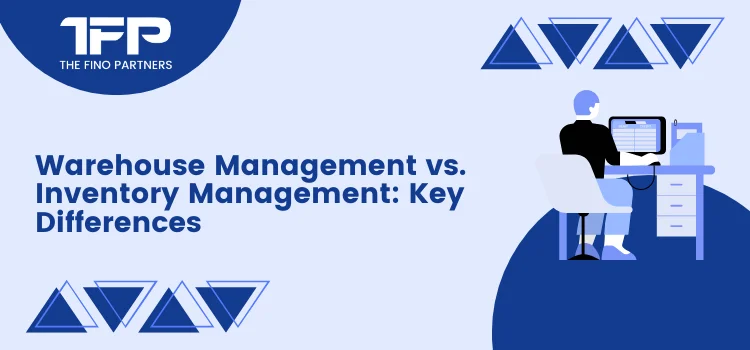How do businesses track thousands of items and ensure items arrive at the perfect moment for their customers? It is not a simple task, but that is where Warehouse Management & Inventory Management come into play. These 2 systems appear identical on the surface, though they actually do different tasks in ensuring everything runs smoothly. Whether you are seeking to enhance your supply chain or simply improve your logistics, these differences are essential. Services like Inventory Management Services can make an enormous impact on keeping businesses organized and effective.
What Is Warehouse Management?
Think of an enormous building stacked with products. Keeping everything organized here is what is simply called Warehouse Management. Warehouse Management handles the daily activities inside the warehouse itself. This includes receiving goods, keeping them where necessary, picking things for orders, packing them up and sending them out.
The technology which performs these jobs is called a WMS. It tracks where each product is located, packages orders correctly, and even directs warehouse staff members to complete their job. In the event you previously watched video clips of robots or even automated machines moving goods around a warehouse, this is a WMS at work.
Warehouse Management is more than organization; it's about maximizing space, lessening errors and accelerating processes. This is essential for businesses who wish to remain competitive and this also includes e-commerce where quick and precise shipping is a big concern.
What Is Inventory Management?
In comparison, Inventory Management is about having enough stock at the right time. It is more strategic and also includes monitoring, controlling and planning your inventory across your supply chain. Inventory Management keeps you from running out of what your customers would like and from getting extra stock which costs you money. It's the system which helps you make sensible choices regarding purchasing, storing and using your inventory.
Inventory Management Services supply businesses with the expertise and tools to monitor merchandise quantities, observe revenue trends and understand when you should replenish stock. This particular service can stay away from issues like running out of best-selling items or having excessive unsellable inventory in storage.
Whereas a warehouse Management System deals with operations in the Warehouse itself, an inventory Management System considers Inventory levels from suppliers to clients.
Differences Between Warehouse Management & Inventory Management
Here is the basic difference between Warehouse management & inventory management:
1. Scope of Work
One distinction between the 2 is their scope. Warehouse Management is what happens inside the warehouse walls. It's responsible for the movement and storage of products themselves, including organizational and logistic aspects. In contrast, inventory Management considers the larger picture, considering different locations and various times for Inventory needs. It involves examining patterns, planning for the future and ensuring there's always stock to satisfy demand.
If you make use of Inventory Management Services, you most likely would maintain stock levels optimized for the whole company; not just deal with how items are kept and selected in a single place.
2. Primary Goals
Warehouse Management is about efficiency. It aims to accelerate operations, utilize space effectively and reduce human errors. Inventory Management is all about balance and accuracy. Having enough stock will be the objective. This difference means that though both systems are related, they place different emphasis on product management.
With inventory Management Services, companies can control their Inventory without making costly blunders like stock outs or even overstocking. These services might frequently include data analysis and forecasting for better inventory choices.
3. Technology Used
Both systems work with specialized software for different purposes. A Warehouse Management System concentrates on real time optimization of tasks like directing employees or even controlling items flow. It might use barcodes and RFID scanners or perhaps automation tools to keep everything organized.
An inventory Management System utilizes data analytics to predict trends and anticipate future Inventory needs. It may integrate with accounting software to compute cost of products sold or utilize algorithms to determine when to reorder products. If you make use of Inventory Management Services, you get software which keeps your company operating smoothly, offering insights and automating processes.
4. User Focus
Warehouse Management is more concerned with staff inside the warehouse. It is supposed to make their jobs easier and more effective. In comparison, Inventory Management targets managers, decision makers and quite often finance teams. The gathered data is utilized to create strategic purchasing and selling decisions for products.
With Inventory Management Services, businesses receive the support they need to make these huge choices. It helps companies know what's selling and what isn't selling and how to modify their strategies accordingly.
Conclusion
Warehouse Management & Inventory Management are different functions which are essential to any company involving physical items. Warehouse Management involves physically handling the goods, whereas Inventory Management concerns planning and maintaining optimal stock levels.
Trying to find a way to save time & money? Then, you ought to consider Inventory Management Services. These services offer the resources and knowledge to help your company manage inventory better and keep your warehouse operations operating smoothly. Knowing the difference between Warehouse and Inventory Management is only the beginning. Using the proper tactics & services you can maintain your business one step ahead.
For your inventory and warehouse management needs, consult The Fino Partners.
Read Also How Can Outsourced Accounting Services Help In Inventory Management?



























